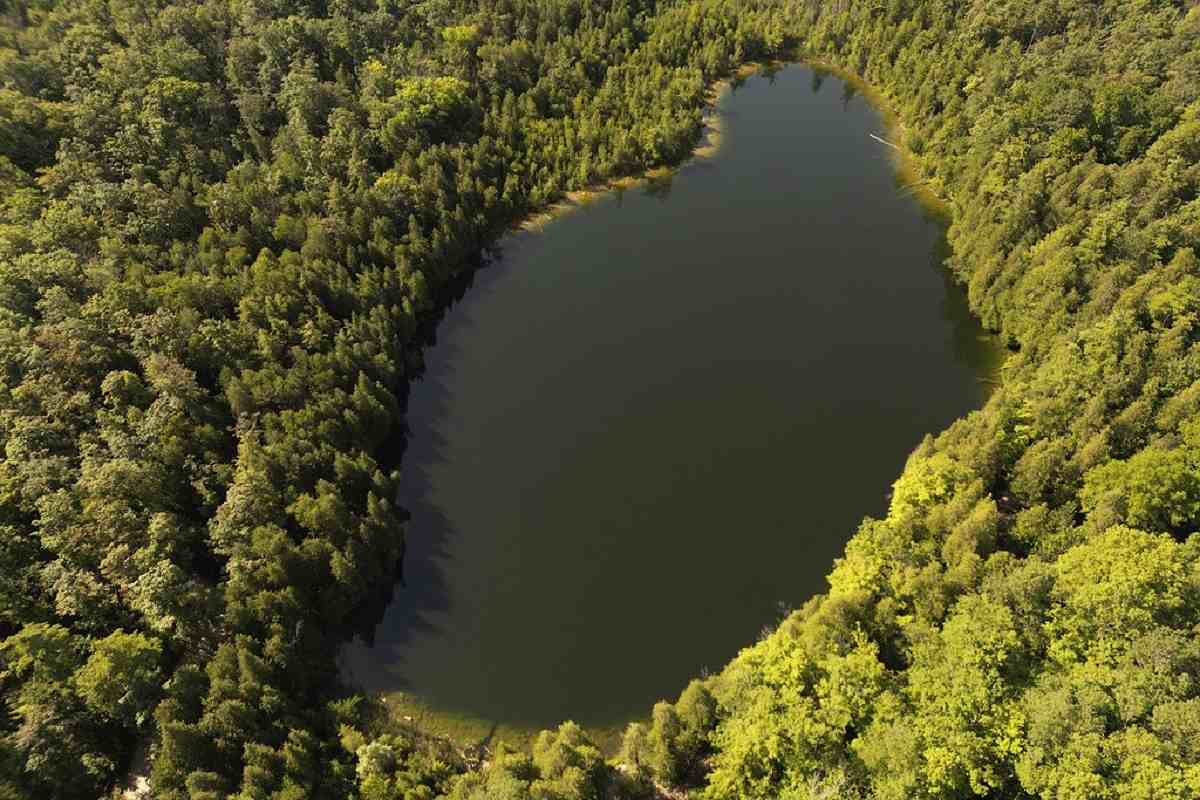Humans’ Impact on the Earth Began a New Epoch in the 1950s Called the Anthropocene, Scientists Say

Trees surround Crawford Lake in Milton, Ontario., on Monday, July 10, 2023.
11:48 JST, July 12, 2023
From climate change to species loss and pollution, humans have etched their impact on the Earth with such strength and permanence since the middle of the 20th century that a special team of scientists says a new geologic epoch began then.
Called the Anthropocene — and derived from the Greek terms for “human” and “new” — this epoch started sometime between 1950 and 1954, according to the scientists. While there is evidence worldwide that captures the impact of burning fossil fuels, detonating nuclear weapons and dumping fertilizers and plastics on land and in waterways, the scientists are proposing a small but deep lake outside of Toronto, Canada — Crawford Lake — to place a historic marker.
“It’s quite clear that the scale of change has intensified unbelievably and that has to be human impact,” said University of Leicester geologist Colin Waters, who chaired the Anthropocene Working Group.
This puts the power of humans in a somewhat similar class with the meteorite that crashed into Earth 66 million years ago, killing off dinosaurs and starting the Cenozoic Era, or what is conversationally known as the age of mammals. But not quite. While that meteorite started a whole new era, the working group is proposing that humans only started a new epoch, which is a much smaller geologic time period.
The group aims to determine a specific start date of the Anthropocene by measuring plutonium levels at the bottom of Crawford Lake.
The idea of the Anthropocene was proposed at a science conference more than 20 years ago by the late Nobel Prize-winning chemist Paul Crutzen. Teams of scientists have debated the issue since then and finally set up the working group to study whether it was needed and, if so, when the epoch would start and where it would be commemorated.
Crawford Lake, which is 79 feet (29 meters) deep and 25,800 square feet (24,000 square meters) wide, was chosen over 11 other sites because the annual effects of human activity on the earth’s soil, atmosphere and biology are so clearly preserved in its layers of sediment. That includes everything from nuclear fallout to species-threatening pollution to steadily rising temperatures.
There are distinct and multiple signals starting around 1950 in Crawford Lake showing that “the effects of humans overwhelm the Earth system,” said Francine McCarthy, a committee member who specializes in that site as an Earth sciences professor at Brock University in Canada.
“The remarkably preserved annual record of deposition in Crawford Lake is truly amazing,” said U.S. National Academies of Sciences President Marcia McNutt, who wasn’t part of the committee.
The Anthropocene shows the power — and hubris — of humankind, several scientists said.
“The hubris is in imagining that we are in control,” said former U.S. White House science adviser John Holdren, who was not part of the working group of scientists and disagrees with its proposed start date, wanting one much earlier. “The reality is that our power to transform the environment has far exceeded our understanding of the consequences and our capacity to change course.”
Geologists measure time in eons, eras, periods, epochs and ages. The scientific working group is proposing that Anthropocene Epoch followed the Holocene Epoch, which started about 11,700 years ago at the end of an ice age.
They are also proposing that it starts a new age, called Crawfordian after the lake chosen as its starting point.
The proposal still needs to be approved by three different groups of geologists and could be signed off at a major conference next year.
The reason geologists didn’t declare the Anthropocene the start of a bigger and more important time measurement, such as a period, is because the current Quaternary Period, which began nearly 2.6 million years ago, is based on permanent ice on Earth’s poles, which still exist. But in a few hundred years, if climate change continues and those disappear, it may be time to change that, Waters said.
“If you know your Greek tragedies you know power, hubris, and tragedy go hand in hand,” said Harvard science historian Naomi Oreskes, a working group member. “If we don’t address the harmful aspects of human activities, most obviously disruptive climate change, we are headed for tragedy.”
Top Articles in News Services
-

Survey Shows False Election Info Perceived as True
-

Prudential Life Expected to Face Inspection over Fraud
-

Hong Kong Ex-Publisher Jimmy Lai’s Sentence Raises International Outcry as China Defends It
-

Japan’s Nikkei Stock Average Touches 58,000 as Yen, Jgbs Rally on Election Fallout (UPDATE 1)
-

Japan’s Nikkei Stock Average Falls as US-Iran Tensions Unsettle Investors (UPDATE 1)
JN ACCESS RANKING
-

Japan PM Takaichi’s Cabinet Resigns en Masse
-

Japan Institute to Use Domestic Commercial Optical Lattice Clock to Set Japan Standard Time
-

Israeli Ambassador to Japan Speaks about Japan’s Role in the Reconstruction of Gaza
-

Man Infected with Measles Reportedly Dined at Restaurant in Tokyo Station
-

Videos Plagiarized, Reposted with False Subtitles Claiming ‘Ryukyu Belongs to China’; Anti-China False Information Also Posted in Japan























